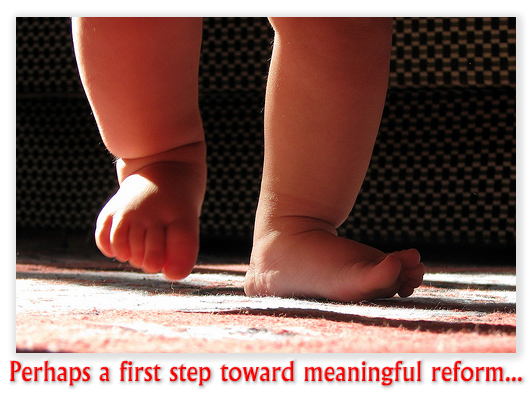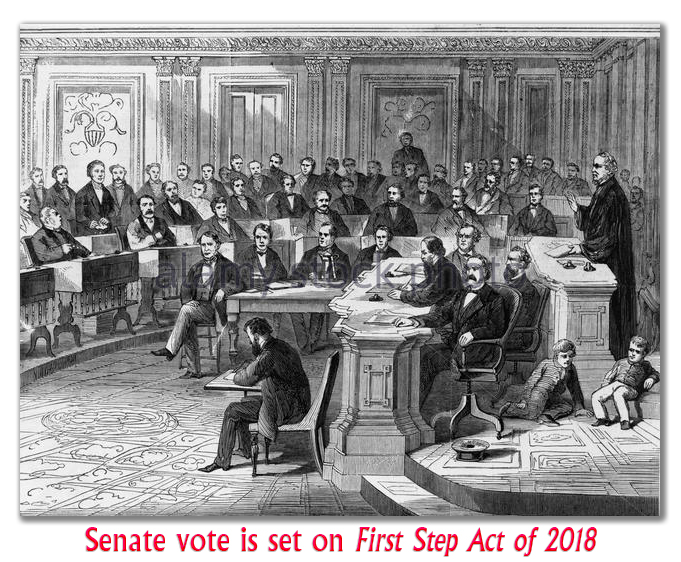We post news and comment on federal criminal justice issues, focused primarily on trial and post-conviction matters, legislative initiatives, and sentencing issues.

FIRST STEP SENATE VOTES SET FOR TODAY AND WEDNESDAY
 Senate Majority Leader Mitch McConnell (R-Kentucky) ended the Senate’s 4-day work last Thursday night by scheduled a procedural vote on the latest revision of the First Step Act of 2018 for 5:30 p.m. today. That vote, promised weeks ago, will be a crucial test of the bill’s backing, where supporters will need to put up 60 votes to advance the bill.
Senate Majority Leader Mitch McConnell (R-Kentucky) ended the Senate’s 4-day work last Thursday night by scheduled a procedural vote on the latest revision of the First Step Act of 2018 for 5:30 p.m. today. That vote, promised weeks ago, will be a crucial test of the bill’s backing, where supporters will need to put up 60 votes to advance the bill.
In the latest iteration of First Step, the measure has been renumbered this year for the third time this year as S.3747 and has dropped its unwieldy title of “Formerly Incarcerated Reenter Society Transformed Safely Transitioning Every Person Act” – and thus the need for all capital letters.
If the Monday vote is successful, the Senate leadership says First Step could be wrapped up Wednesday, after allowing opponents the opportunity to have yet amendments considered. “My impression is that people are not going to string this out unnecessarily for procedural reasons, as long as they get an opportunity to make their arguments and have a vote on their amendment,” said Senate Majority Whip John Cornyn (R-Texas), who announced his support for First Step this week.
Supporters say they have at least 70 votes for the measure, although cosponsors of the measure are officially at 35. Sen. Roy Blunt (R-Missouri), a member of Senate leadership, predicted that “slightly more than half” of the GOP conference and as many as 30 of the 51 GOP senators could back it.
As McConnell set the week’s votes last Thursday, Sen. Mike Lee (R-Utah) sought to make last-minute changes in First Step that would reflect a compromise the bill’s supporters had reached with Sen. Ted Cruz (R-Texas). Cruz endorsed the bill because it was supposed to bar many violent criminals from earning early release, but the version that was presented on Wednesday (which is available online) did not include all of the exclusions Cruz had been promised. Lee tried to get McConnell to change them, according to multiple people familiar with the matter, but McConnell wanted to give his divided caucus at least 24 hours to review the new just-released text. The bill‘s chief critic, Sen. Tom Cotton (R-Arkansas), joined in a private meeting with McConnell, Lee and Cornyn on the Senate floor Thursday afternoon, during which Lee argued that the changes should be made to increase the bill‘s conservative support.
To get any amendments into the bill, the legislation must be amended on the Senate floor. Cruz’s endorsement was critical to moving the bill forward, and he has repeatedly touted that the legislation would no longer allow the early release of violent criminals.
 McConnell will allow only a little time and very few amendments to First Step before the Wednesday vote. After the Senate begins debating the bill, it will ultimately take 60 votes to pass it. And an amendment, however, will require just 50 votes in the narrowly divided Senate. Cotton and Sen. John Kennedy (R-La.) are expected to offer an amendment to add new exclusions to the list of inmates not allowed to get program credits. Because amendments need only a simple majority, some Republicans will have to vote against them to keep the provisions from being added to the legislation. One senator predicted that many Democrats would probably defect from the legislation if the Cotton amendment passed.
McConnell will allow only a little time and very few amendments to First Step before the Wednesday vote. After the Senate begins debating the bill, it will ultimately take 60 votes to pass it. And an amendment, however, will require just 50 votes in the narrowly divided Senate. Cotton and Sen. John Kennedy (R-La.) are expected to offer an amendment to add new exclusions to the list of inmates not allowed to get program credits. Because amendments need only a simple majority, some Republicans will have to vote against them to keep the provisions from being added to the legislation. One senator predicted that many Democrats would probably defect from the legislation if the Cotton amendment passed.
Still, First Step will pass as long as it survives an uncertain amendment process. Most Senate Democrats support it, a significant bloc of Republicans is expected to back it, and President Donald Trump is expected to sign it if it passes the Senate and House ahead of the Dec. 21 partial government shutdown deadline.
The biggest immediate impact of First Step would be felt by nearly 2,600 federal prisoners convicted of crack offenses before 2010. That’s the year the Fair Sentencing Act reduced the disparity in punishment between crack cocaine and the powdered form of the drug. First Step would make the reform retroactive.
 All federal inmates will benefit from an increase in good time from 47 days a year to 54 days a year, retroactive to the beginning of each inmate’s sentence. The change is estimated to result in 4,000 extra prisoners being released in the next year, some immediately.
All federal inmates will benefit from an increase in good time from 47 days a year to 54 days a year, retroactive to the beginning of each inmate’s sentence. The change is estimated to result in 4,000 extra prisoners being released in the next year, some immediately.
If it passes the Senate, the House and Senate will have to reconcile their different versions of First Step and then approve the reconciled version, all before Dec. 21. Rep. Steny Hoyer, D-Maryland, the House minority whip, told reporters last week, “I presume… we will be able to approve it next week. I’m hopeful that it can move that quickly.” The New York Times said House Speaker Paul Ryan (R-Wisconsin) has pledged swift action before the House leaves town for the year-end holidays.
The Hill, McConnell sets Monday test vote on criminal justice bill (Dec. 13)
Politico, GOP infighting continues as criminal justice bill advances (Dec. 13)
The Hill, Senate heads toward floor fight on criminal justice bill (Dec. 14)
The Marshall Project, What’s Really in the First Step Act? (Nov. 16)
First Step Act of 2018, S.3747 (Dec. 12)
The New York Times, Criminal Justice Bill Will Go Up for a Vote, McConnell Says (Dec. 12)
– Thomas L. Root

